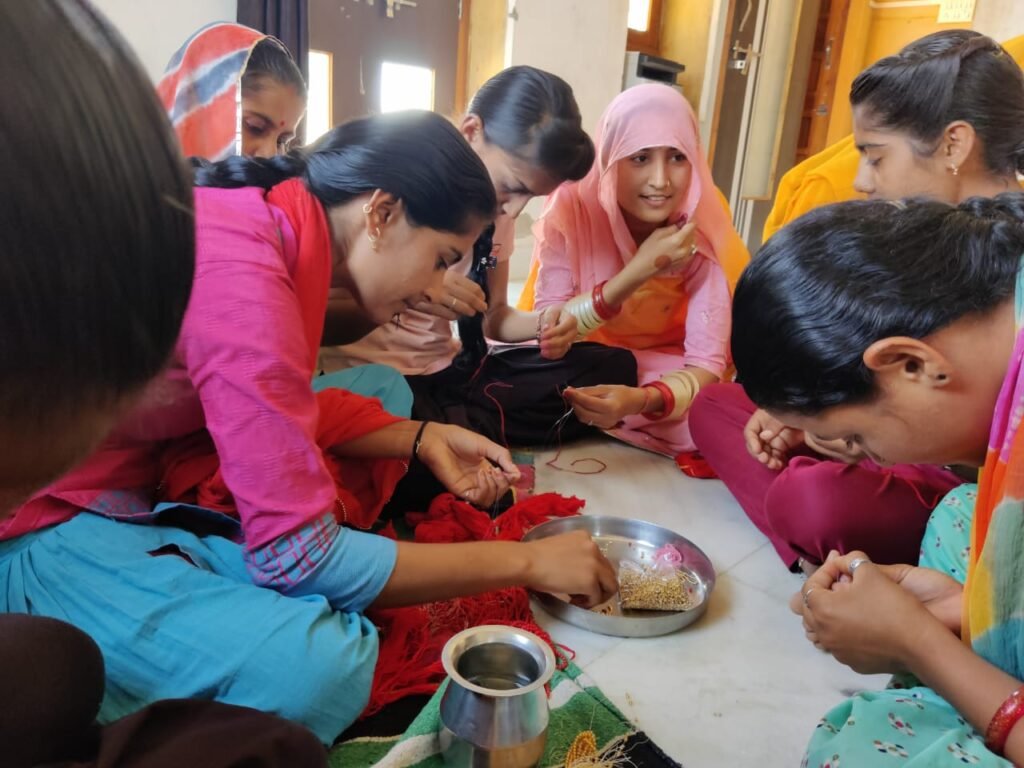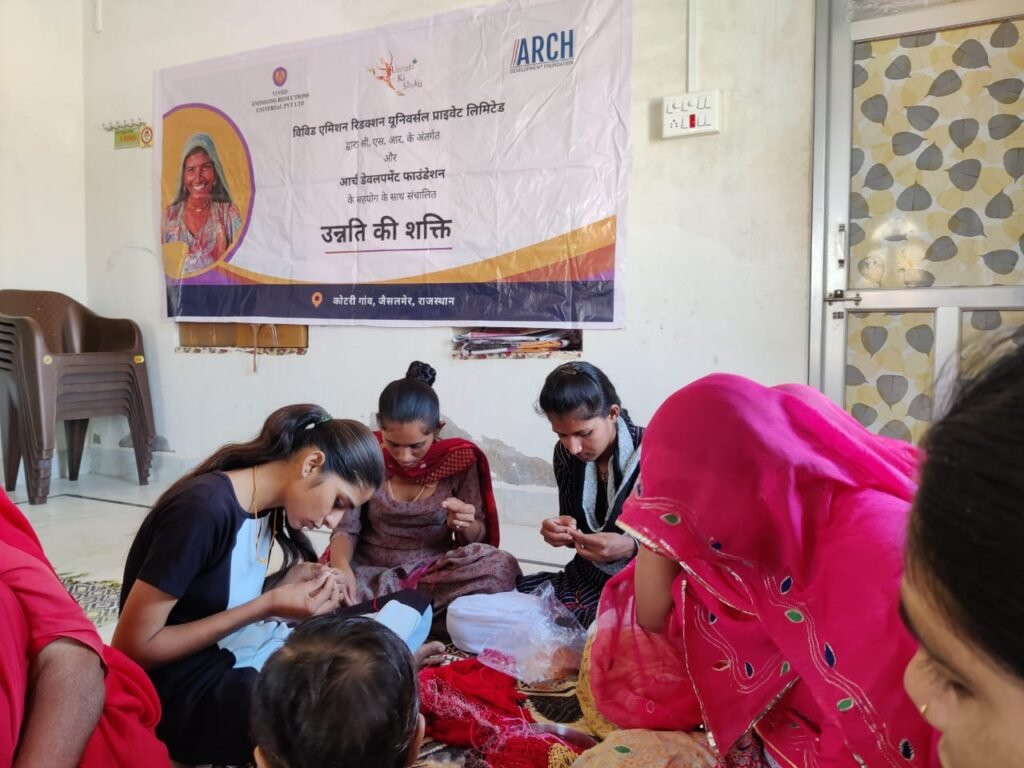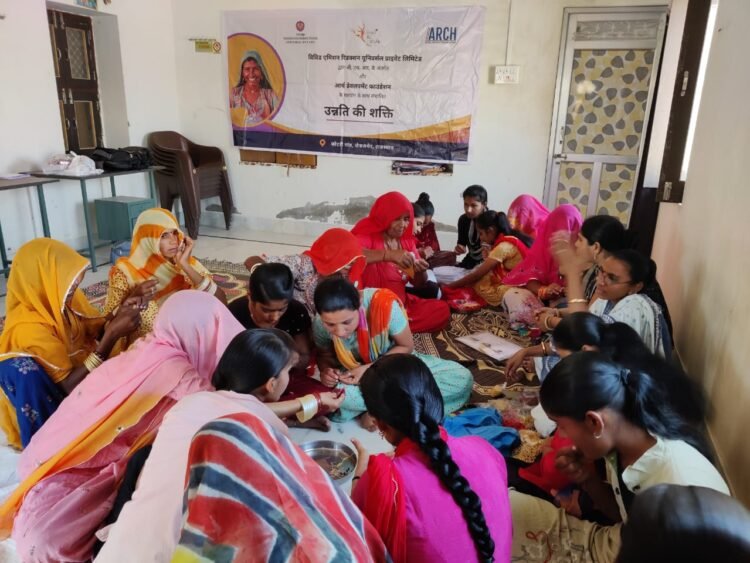Skill enhancement workshops which happen to be one of the most important elements of this intervention officially commenced today.
Kotri Village, Jaisalmer District, Rajasthan: Next year when a brother gets a Rakhi tied on his wrist by his sister, not only would he receive divinely sublime blessings from her but also perhaps from yet another unsung Sister in Kotri Village of Jaisalmer District in Rajasthan who made that sacred thread in the first place.
Kotri is the same village where Viviid Emissions Reductions Universal Private Limited has rolled out its CSR Intervention ‘Unnati Ki Shakti’ in collaboration with ARCH Development Foundation.
This carefully designed social intervention is pivoted around empowerment of Women and Girls with focus on zero tolerance for gender-based violence, formation of SHGs, skill enhancement, associated livelihood generation, financial literacy, personality development, creating awareness about laws, rights and social welfare schemes run by Central and State Governments and imparting self-defence combative training.
Skill enhancement workshops which happen to be one of the most important elements of this intervention officially commenced today. Professional Craft Experts are training women for Rakhi Making so that they could imbibe this skill that will positively impact their livelihood.

Rakhi making workshop underway in Kotri Village of Jaisalmer District in Rajasthan: Photo: India CSR
Explaining about this skill building and livelihood enhancement workshop at Kotri Village, Ms. Veena Ben Jadhav, the special trainer facilitated by ARCH Development Foundation said, “In the first phase of this CSR Pilot Intervention a total of 25 women and adolescent girls made it for the Rakhi making workshop. For all those who thought that Rakhis are made just about a couple of months ahead of the festival which is observed in August every year, it is time for a fact re-check.”
“Rakhi making is a perennial industry that runs right from April through March much like any other business in India with proper books of accounts. The beaming smiles and confidence of women and adolescent girls who have joined in for this workshop is the real fuel that propels us to keep working for this worthy cause wherever we go.”
Briefing about the macro perspective, Ms. Sonkee Shah, CEO and Founder of ARCH Development Foundation said, “According to Confederation of All India Traders (CAIT), about 50 crore Rakhis are sold every year in India, amounting to approximately Rs 6,000 crore. The Final Order for a year is completed and delivered by 20th March to wrap up the financial year. The Rakhis that our sisters are making at this workshop will be utilised for the festival that will be celebrated in August 2023. The orders that will be completed and delivered in April 2023 will be utilised during the festival that will be celebrated in 2024. We have a strong tie up with traders across the country who source Rakhis from us round the year.”

“80% of what they source is for the export market. We ensure that our sisters who make these Rakhis get their fair share of remuneration that adhere to the principles of Decent Working Conditions accredited by the ILO and honoured by our Government. After all they put in so much of their time, skills and efforts in the entire process. We have already secured an order of 100,000 Rakhis for the women of Kotri Village.”
This will have to be made and delivered by February 2023. We will provide them adequate training so that they are up on their feet to honour this commitment. Of course, other factors like time invested per day by the women and adolescent girls will also play a pivotal role in deciding what they will be able to earn by February 2023. Based on our experience, each woman will be able to earn anywhere between Rs. 3000 – Rs. 5000/- by February next year.”
“For beginners it is a reasonable start which will only increase and improve with time. That’s not all, for these two days that the women and girls will be investing in learning Rakhi making, they shall be paid a stipend. Even for this training workshop we have bagged a confirmed order for making 3000 Rakhis. On our way back to Vadodara we will be carrying these Rakhis that will be made over the next two days. These women and adolescent girls will regularly be coached for honing and upgrading their skills to meet the expectations of this ever-evolving industry eclectically matching the pace and trend of the burgeoning export market.”

In a telephonic interview with our Correspondent, CEO of Viviid Emissions Reductions Universal Private Limited Puneet Katyal said, “Financial Independence is the pre-requisite for Women Empowerment. I am very glad to note that our sisters in Kotri Village of Jaisalmer District have embarked upon this journey where they will learn new skills and put them to good use for positively enhancing their livelihood, prosperity, happiness quotient and most importantly self-confidence. In a superlatively patriarchal social set-up where it is next to impossible to convince men to send their wives out to learn new livelihood skills, we have successfully brought market opportunities at their doorstep. This in itself is quite gratifying and noteworthy. Seeing the success of first batch, more women will be inclined to take up this livelihood enhancement activity. With year round demand for Rakhis, the order pipeline will never dry up and so won’t the income streams of our sisters in Kotri Village.
In fact it is one of the most quantifiable outcomes of our Intervention that will empower women and adolescent girls alike. Working for our clients who are developers of renewable energy projects and nature based solutions we are already in the clean and green space catering to the Planet. Further our co-benefit-oriented social interventions are specially designed to empower People in the communities of far-flung areas where our Clients operate. Once counselled, coached and trained these People who are just like our extended family get on to the Prosperity bandwagon. Thus the tenets of the Trigonal Paradigm of People, Planet and Prosperity are established, strengthened and invariably re-enforced. This is truly sustainable and scientific.”







